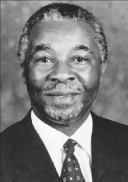Gays call Mbeki proposal ‘apartheid;’ conservatives unhappy too
Facing a deadline of December 1 set late last year by the nation’s highest court to cure the inequality of the existing marriage law, the government and cabinet of South African President Thabo Mbeki has proposed that Parliament adopt a Civil Union Bill that would allow both same-sex and opposite-sex couples to form legally-recognized “civil partnerships.”
The proposal went before the State Law Advisors, which screens laws for form and constitutionality, and the SLA immediately suggested that the law does not comply with constitutional requirements. The office advised that a direct amendment of the Marriage Act would be preferable, but the minister of home affairs insisted that the government bill would be submitted to Parliament regardless of the objections.
Some LGBT advocacy groups quickly reacted with condemnation of the creation of a separate legal status for same-sex couples, arguing that the proposal did not comply with the court order, and that the bill would create “sexual apartheid” for gays in South Africa. They vowed to lobby the Parliament to instead amend the Marriage Act.
Under the Civil Unions Bill, civil partnerships would be treated as legally the same as marriage, but “with such changes as may be required by the context.” The bill does not specify what such changes might be, a question that could be resolved during the legislative process or in litigation after the bill becomes law. Civil unions can be terminated by divorce, just as with marriage.
Mbeki’s cabinet rejected an alternative proposal that would have simply amended the Marriage Act along lines suggested in the Constitutional Court’s opinion.
News reports about the August 23 cabinet meeting and a subsequent press conference on August 24 differed as to what was being proposed, perhaps due to a statement by government spokesperson Themba Maseko, who said, “Basically it will legalize same-sex marriage in compliance with the Constitutional Court ruling,” and to the failure of the government to make the complete text of the approved bill immediately available.
Maseko’s use of the word “basically” was a clear tip-off that something was afoot, as the bill that was approved and released publicly the following week fudges the issue of marriage and also contains detailed provisions establishing yet another legal status of registered or unregistered domestic partnership for couples who do not wish either to marry or to become civil partners. (The domestic partnership status provides a handful of specific rights and responsibilities, focusing on support obligations and housing, and includes divorce-style procedures for terminating unions and dividing assets.)
The Marriage Act contains a specific verbal “formula” that officers conducting marriages are supposed to use, and the government’s bill provides that “marriage officers” authorized under the Marriage Act can conduct civil partnership ceremonies, and details a “civil partnership formula” for them to use. Marriage officers are directed to inquire of the parties whether they “would prefer their civil partnership to be referred to as a civil partnership or a marriage during the solemnization ceremony,” and to use the preferred terminology.
However, there is no indication that the law will automatically treat civil partners as being “married,” so the provision regarding language during the ceremony is odd. In fact, the government draft includes a “conscience” provision that allows marriage officers to opt out of performing civil partnership ceremonies, provided that they have communicated in writing to the minister of home affairs that they object to performing such ceremonies “on grounds of conscience.”
Some early press reports stated that the government was proposing “same-sex marriage,” when the intention seems more akin to the approach taken in the United Kingdom, where a Civil Partnership Law went into effect last year on December 1, the very day the South African Constitutional Court issued its ruling.
That ruling, it must be noted, did not dictate a specific legislative solution. Justice Albie Sachs’ majority opinion stated that the existing common law and statutory definitions of marriage were inconsistent with the South African Constitution, which has a striking commitment to legal equality and specifically bans discrimination on the basis of sex or sexual orientation. However, the court decided that the most prudent remedy was to “suspend” its decision’s effect for one year to give Parliament the opportunity to devise a constitutionally appropriate statutory scheme to respond.
Sachs devoted a lengthy portion of his decision to discussing the remedial issue, emphasizing that true equality was required, and warning against a “separate but equal” scheme that would in fact create an inferior institution for same-sex couples. He spoke very favorably about amending the marriage law directly, and also devoted considerable discussion to a proposal from the South Africa Law Review Commission, which had held lengthy public hearings and proposed a new marriage law, open to both same-sex and opposite-sex couples, to stand alongside an unchanged traditional marriage law, still available only to opposite-sex couples. Both laws would carry identical legal rights and responsibilities.
Sachs wrote that the court was not endorsing any particular approach, leaving that to Parliament.
Conservative groups have also stated their opposition to the proposal from the Mbeki governed, after having unsuccessfully lobbied his cabinet to endorse a constitutional amendment banning legal recognition for same-sex unions. The anti-gay forces are planning nationwide protests on September 16.
gaycitynews.com



































